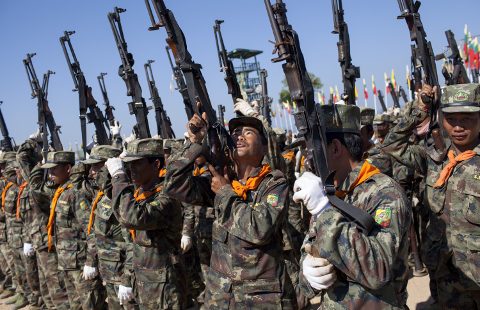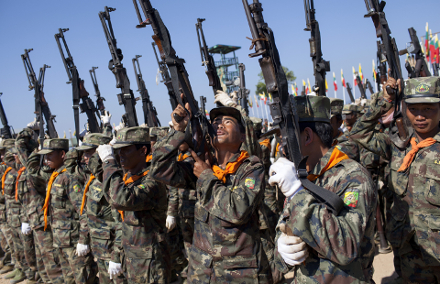A fast-changing Myanmar must bed down peace and end decades of civil war if it hopes to cement the progress of recent reforms.
George Orwell’s 1936 essay “Shooting an elephant”is a powerful meditation on life during and after colonial rule in Burma.
British officer Orwell feels compelled to demonstrate the might of the world’s largest empire by shooting a rogue elephant which, after escaping its enclosure, had destroyed local property and trampled to death one unlucky Indian indentured labourer – not “worth the life” of so prized a beast of burden.
Followed by a large crowd excited by his oversized rifle and murmurs of murder, Orwell finds the “mad” animal peacefully standing in a field on the edge of town. Reluctantly, he shoots it, the animal taking several hours to die.
Long after the elephant had been picked for its hide, meat and bone, and Orwell had left for futures more dystopian, Myanmar’s became more despotic. After British rule, the country collapsed into almost 70 years of civil war (the longest ongoing in modern history), and sectarian and ethnic violence, witnessing the rise of a military willing to use brutal force to maintain control. Like most of Orwell’s writing, a parable about ruling by the rifle was hauntingly prescient.
Unfortunately for Myanmar, despite recent moves from military to semi-civilian rule, the elephant is still in the field today… and once again it threatens violence.
Since the passing of a new constitution in 2008, and non-democratic elections in 2010, Myanmar’s military leaders look increasingly keen to turn their backs on the nation’s martial past. In the last five years, the country has undergone astonishing political, economic and social reform.
It has seen the arrival of grand shopping malls and fast food in the richer suburbs of Yangon. Young and old, rich and poor, can afford SIM cards to power mobile phones and lubricate social connections and gateways to the wider world via Facebook.
The newly constructed capital of Naypyitaw, an abode of kings with manicured lawns and vast government compounds carved from scrubland and rice paddies, shines with the gaudy trappings of a revitalised nation.
Membership of ASEAN, opening its front door to the West, the lifting of economic sanctions, increased press freedom, investments in the institutions of law and justice: all are welcome changes in what was once an international pariah.
All of this is supposed to culminate with historic free elections later this year, which while seeing the military taking a prime role through its Union Solidarity and Development Party, will likely be more reflective of popular sentiment, with long-time democracy campaigner Aung San Suu Kyi’s National League for Democracy well-placed to claim a lion’s share of seats.
Among the changes, Myanmar’s former military masters have also worked hard to reconcile past ethnic conflict and ongoing insurgencies. Like much of the mess European colonisers left in the wake of their worldwide conquests, these conflicts have their roots in minorities left at the fringes of a reconstituted nation who took up arms when they realised they were being denied autonomy.
However, in recent years democratic reform had gone hand-in-hand with peace talks, with ceasefires negotiated with all the country’s major rebel groups – most notably the Kachin Independence Army (KIA). There was even a historic accord with the Karen National Union, whose army has waged war with the central government since 1949.
Yet, although conflict has declined nationwide, fighting with the KIA has flared up again, as too with the Myanmar National Democratic Alliance Army (MNDAA) based in the Chinese-speaking, self-administered area of Kokang in the northeast of Shan state and near the border with China.
Just this weekend, 24 MNDAA fighters were killed by the state’s security forces. A sustained military campaign since February has put paid to six years of relative calm.
The renewed conflict with the Kachin has also caused a humanitarian crisis and led to international condemnation of the military for alleged human rights abuses. These recent escalations show that there is no silver bullet to historical legacies, and the potential for renewed conflict is only a strike of the match away.
To temper the mood of Myanmar’s oft-vaunted reform, there is also the major problem of sectarian violence between the country’s majority Buddhist and minority Muslim populations. Rearing its ugly head in riots in Rakhine State in 2012, which saw hundreds killed and some 100,000 people internally displaced, the clashes soon quickly spread throughout the nation.
At the pointy end of the stick are Myanmar’s Rohingya Muslims, who aren’t recognised by the constitution, who were overlooked in the country’s first census in 30 years in 2014, and have for many years lived miserably, hungrily and meagrely in camps often labelled as open-air prisons.
The country’s peace process makes no provision for dealing with the ongoing sectarian violence. Meanwhile, the Myanmar government refuses to even recognise the term Rohingya – simply saying they do not exist. If things keep going as they are, they may soon have their wish.
It’s partly to blame for the thousands of desperate Rohingya who were left stranded at sea off Indonesia, Malaysia and Thailand until only this Thursday.
It is in this context that The Australian National University will host the 2015 Myanmar/Burma Update. Taking place in Canberra on 5-6 June, the conference brings together leading scholars from Australia, Myanmar and around the globe, to “make sense of conflict” and examine how best the country can negotiate peace through its path of reform.
This event will provide a holistic account of the country’s longstanding conflicts and the prospects of efforts to stop them, from a range of perspectives from people based on the ground and experts who have been watching them closely from further afield. We think that such issues need our urgent attention.
For like the spectre of Orwell’s elephant, Myanmar is still haunted by its violent past. Until it meets this next major challenge – long-lasting and sustainable peace with its myriad of minorities – then political, economic and social reforms could soon be nothing more than the picked over remains of a gentle giant gone “mad” with violence.
Nicholas Farrelly is co-founder and James Giggacher is editor of New Mandala. The 2015 Myanmar/Burma Update takes place at ANU on 5-6 June.
This article was also published at The Drum.
 Facebook
Facebook  Twitter
Twitter  Soundcloud
Soundcloud  Youtube
Youtube  Rss
Rss 
